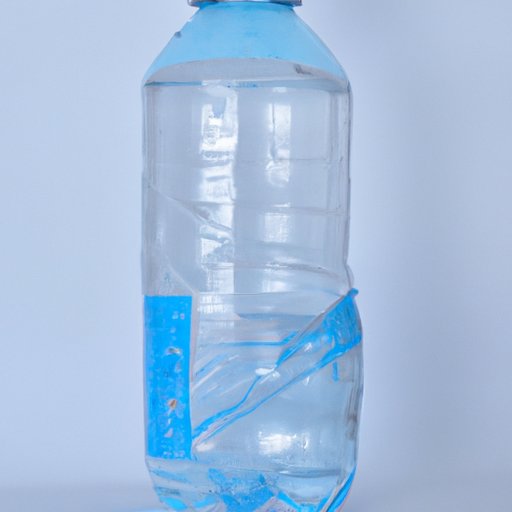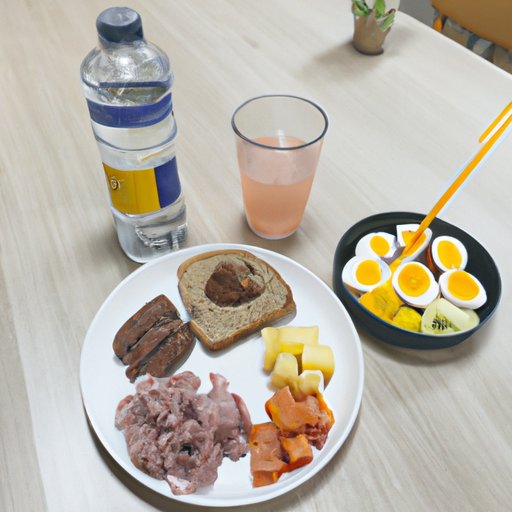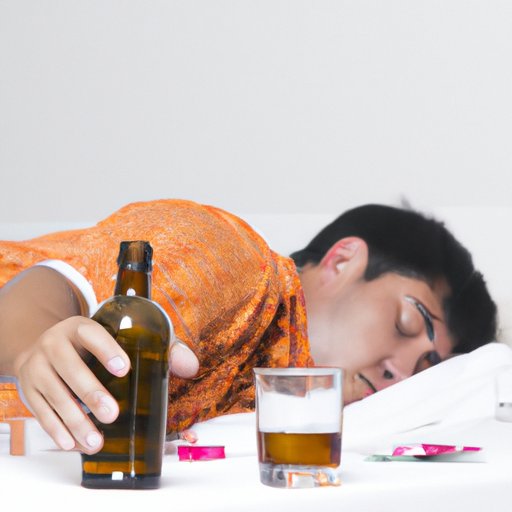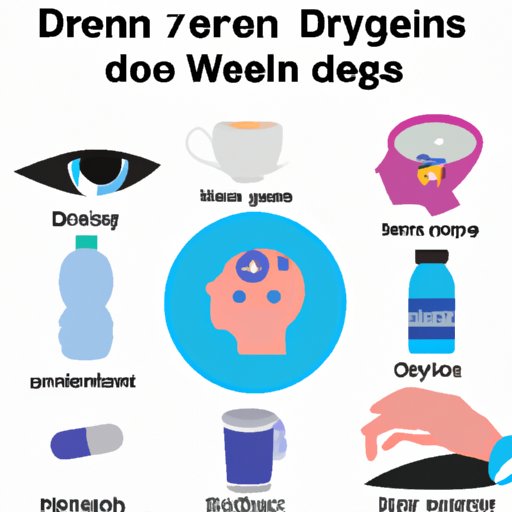Introduction
Dizziness is a common symptom experienced by many people after a night of drinking. It can range from mild lightheadedness to severe vertigo, which can make it difficult to move without feeling like you’re going to fall over. There are a few different reasons why people get dizzy after drinking, but there are also ways to prevent it or lessen the effects.

Drink Plenty of Water Throughout the Day
One of the best ways to prevent dizziness after drinking is to stay hydrated throughout the day. Drinking plenty of water will help your body process the alcohol more efficiently and reduce the amount of dehydration that can lead to dizziness. Additionally, staying hydrated can help reduce the risk of hangovers the next day.
Benefits of Staying Hydrated
Staying hydrated has many benefits, including improved cognitive function, better digestion, increased energy levels, and improved mood. It can also help prevent headaches and other symptoms associated with dehydration. Furthermore, staying hydrated will help your body process the alcohol more quickly, reducing the chances of feeling dizzy the next day.
Tips for Making Sure You Stay Hydrated
In order to stay hydrated, it’s important to drink plenty of fluids throughout the day. Aim to drink at least 8 glasses of water per day. Additionally, try to avoid drinks with a lot of sugar, such as soda and energy drinks, as these can contribute to dehydration. If you’re out drinking, alternate between alcoholic beverages and water to ensure that you’re getting enough fluids.
Avoid Sugary Drinks or Energy Drinks
Another way to prevent dizziness after drinking is to avoid sugary drinks or energy drinks. These drinks can cause dehydration, which can contribute to dizziness. Additionally, they can contain high amounts of caffeine, which can also lead to dizziness and other unpleasant side effects.
Reasons for Avoiding Sugary Drinks and Energy Drinks
Sugary drinks and energy drinks can cause dehydration due to their high sugar content. Additionally, they can contain high amounts of caffeine, which can lead to increased heart rate, anxiety, and jitteriness. All of these can contribute to feeling dizzy the next day.
Alternatives to Sugary Drinks or Energy Drinks
If you’re looking for an alternative to sugary drinks or energy drinks, try drinking sparkling water or flavored seltzer with a splash of juice. These options are lower in sugar, and still provide some flavor. Additionally, you can opt for non-alcoholic beers or low-alcohol wines, which are lower in alcohol content and therefore less likely to cause dizziness.

Eat a Balanced Meal Before Drinking
Eating a balanced meal before drinking can help reduce the chances of feeling dizzy the next day. Eating a meal that includes protein, carbohydrates, and healthy fats will help slow down the absorption of alcohol, and can help prevent dehydration.
Benefits of Eating a Balanced Meal
Eating a balanced meal before drinking can help reduce the risk of feeling dizzy the next day. This is because it helps slow down the absorption of alcohol, which can reduce the chances of becoming dehydrated. Additionally, eating a balanced meal can help keep your blood sugar levels stable, which can help prevent dizziness.
What Constitutes a Balanced Meal
A balanced meal should include foods from all the major food groups, including proteins, carbohydrates, and healthy fats. Examples of balanced meals include a salad with grilled chicken and avocado, a turkey sandwich with vegetables and hummus, or a bowl of oatmeal with nuts and fruit. Eating a balanced meal before drinking can help reduce the chances of feeling dizzy the next day.
Have a Snack or Light Meal Before Bed
Having a snack or light meal before bed can help prevent dizziness the next day. Eating something light can help replenish the nutrients that were lost while drinking, and can help stabilize blood sugar levels. This can help reduce the chances of feeling dizzy the next day.
Benefits of Having a Snack or Light Meal
Having a snack or light meal before bed can help reduce the chances of feeling dizzy the next day. Eating something light can help replenish the nutrients that were lost while drinking, and can help stabilize blood sugar levels. Additionally, eating something before bed can help reduce the chances of feeling nauseous in the morning.
Examples of Healthy Snacks or Light Meals
Examples of healthy snacks or light meals include yogurt with fruit and nuts, a peanut butter and banana smoothie, or a bowl of whole grain cereal with milk. These snacks and meals are light, yet still provide essential nutrients that can help reduce the chances of feeling dizzy the next day.
Take Ibuprofen or Acetaminophen to Relieve Headache
Taking ibuprofen or acetaminophen can help relieve headaches and other symptoms associated with dizziness. Taking either of these medications can help reduce pain and inflammation, and can help reduce the chances of feeling dizzy the next day.
Benefits of Taking Ibuprofen or Acetaminophen
Ibuprofen and acetaminophen can both help reduce pain and inflammation associated with headaches. Additionally, taking ibuprofen or acetaminophen can help reduce the chances of feeling dizzy the next day, as it can help reduce any swelling or inflammation in the inner ear.
Precautions When Taking Ibuprofen or Acetaminophen
It’s important to take ibuprofen or acetaminophen as directed. Additionally, if you’re taking any other medications, it’s important to check with your doctor before taking ibuprofen or acetaminophen. Finally, if you’re pregnant or breastfeeding, it’s important to talk to your doctor before taking these medications.

Get Plenty of Rest and Sleep the Night After Drinking
Getting plenty of rest and sleep the night after drinking can help reduce the chances of feeling dizzy the next day. Getting enough rest and sleep can help your body recover from the effects of alcohol, and can help reduce the chances of feeling dizzy.
Benefits of Getting Plenty of Rest and Sleep
Getting enough rest and sleep can help your body recover from the effects of alcohol, and can help reduce the chances of feeling dizzy the next day. Additionally, getting enough rest and sleep can help improve cognitive function, reduce stress, and improve overall health.
Tips for Getting Enough Rest and Sleep
In order to get enough rest and sleep, it’s important to create a nighttime routine. Try to go to bed and wake up at the same time every day, and limit the use of electronics before bed. Additionally, try to avoid caffeine and alcohol close to bedtime, as these can interfere with sleep. Finally, try to make sure that your bedroom is dark, quiet, and comfortable.
Conclusion
Dizziness is a common symptom experienced by many people after a night of drinking. However, there are ways to prevent it or lessen the effects. Drinking plenty of water throughout the day, avoiding sugary drinks or energy drinks, eating a balanced meal before drinking, taking ibuprofen or acetaminophen, and getting plenty of rest and sleep the night after drinking can all help reduce the chances of feeling dizzy the next day.
Summary of Key Points
To recap, here are the key points to remember when trying to prevent dizziness after drinking: drink plenty of water throughout the day, avoid sugary drinks or energy drinks, eat a balanced meal before drinking, have a snack or light meal before bed, take ibuprofen or acetaminophen to relieve headache, and get plenty of rest and sleep the night after drinking.
Final Thoughts on How to Not Be Dizzy Day After Drinking
Dizziness after drinking can be a nuisance, but there are ways to prevent it or lessen the effects. By following the tips outlined in this article, you can reduce your chances of feeling dizzy the next day. Remember to drink plenty of water, avoid sugary drinks and energy drinks, eat a balanced meal, have a snack or light meal before bed, take ibuprofen or acetaminophen, and get plenty of rest and sleep.
(Note: Is this article not meeting your expectations? Do you have knowledge or insights to share? Unlock new opportunities and expand your reach by joining our authors team. Click Registration to join us and share your expertise with our readers.)
